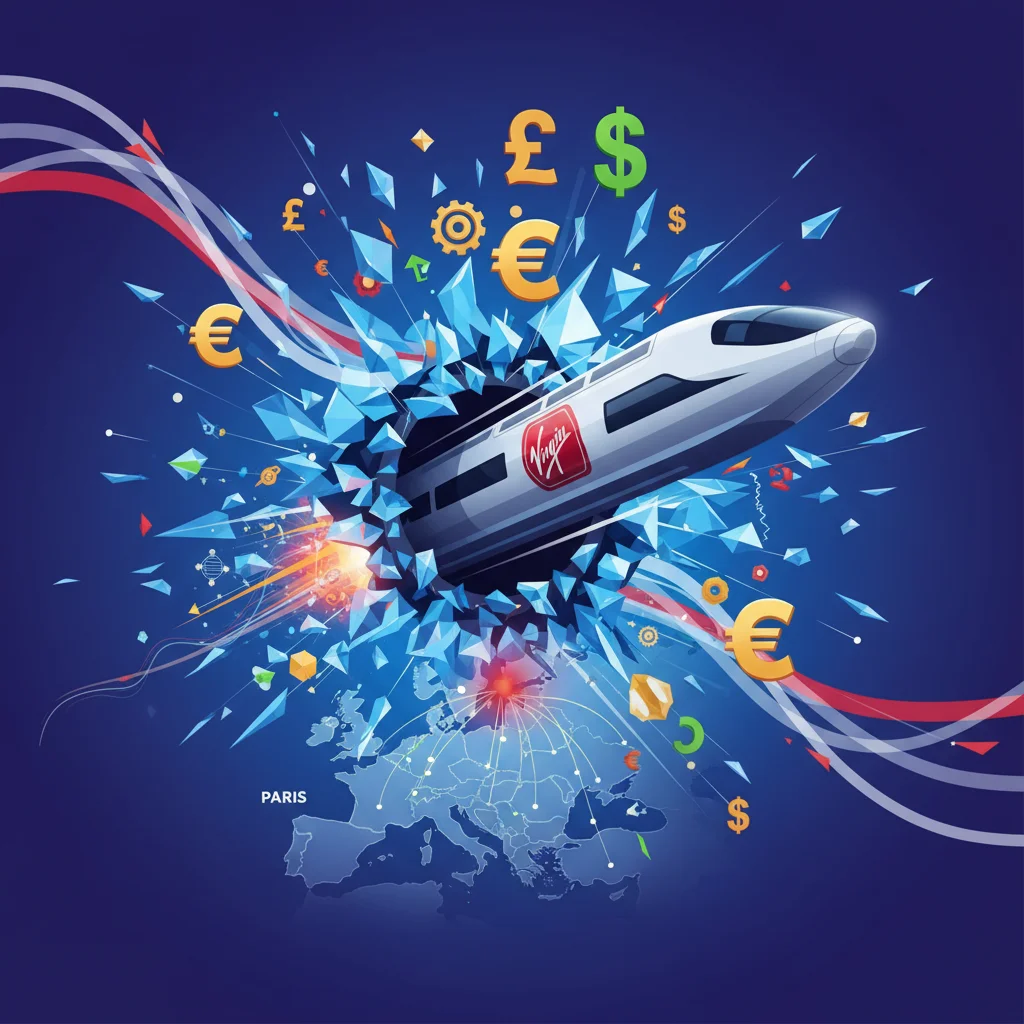
The Branson Effect Returns: Virgin’s Bid to Disrupt the Channel Tunnel and What It Means for the Economy
For three decades, the journey from London to Paris via the Channel Tunnel has been synonymous with one name: Eurostar. It’s a route that has become a cornerstone of European travel, a symbol of cross-channel cooperation, and a lucrative near-monopoly. But the winds of change are blowing through the tunnel. In a move that promises to shake up the market, Richard Branson’s Virgin Group has announced its intention to launch a rival passenger rail service by 2030, a development first reported by the BBC.
This isn’t just about adding a few more trains to the schedule. This is a classic market disruption play, a significant event with far-reaching implications for consumers, the transport industry, and, crucially, for those interested in finance and investing. The announcement signals a new chapter in European infrastructure, challenging a long-standing incumbent and testing the waters of post-Brexit competition. For business leaders and finance professionals, Virgin’s ambitious plan is a live case study in market entry, capital-intensive economics, and the strategic battle for dominance in a high-barrier-to-entry sector.
A Three-Decade Reign: The Eurostar Monopoly
Since its inaugural service in 1994, Eurostar has been the sole passenger operator through the Channel Tunnel. It has successfully built a powerful brand and a loyal customer base, transporting over 200 million passengers and becoming an indispensable link for business and leisure travel. This dominance has been protected by formidable barriers to entry: the astronomical cost of specialized rolling stock, complex safety regulations, and the challenge of securing access to congested high-speed lines and prime station slots in London, Paris, and Brussels.
Others have tried and failed. Germany’s national operator, Deutsche Bahn, announced plans over a decade ago to run services from Frankfurt and Amsterdam to London. Despite conducting test runs and receiving technical approvals, the project was ultimately shelved due to a combination of financial hurdles and strategic reprioritization. This history underscores the sheer difficulty of challenging Eurostar’s position, making Virgin’s announcement all the more audacious. It raises a critical question from an investing perspective: what has changed to make Virgin believe it can succeed where others have faltered?
From Sand to Gold: The Agri-Tech Revolution and the New Investment Frontier
Deconstructing the Financial and Logistical Gauntlet
Launching a rival service is a monumental undertaking, demanding a masterful navigation of financial, regulatory, and operational challenges. For investors and analysts, understanding these hurdles is key to assessing the viability of Virgin’s venture and its potential impact on the wider economy.
The first and most obvious challenge is capital. The finance required will be immense. Virgin will need to procure a fleet of new, state-of-the-art trains that meet the unique and stringent safety specifications for the Channel Tunnel. These are not off-the-shelf items; they are bespoke, multi-million-pound assets. Beyond the hardware, there are the substantial costs of securing track access rights from network operators in the UK, France, and Belgium, as well as from the tunnel operator itself, Getlink. According to industry experts, the total investment could easily run into the billions (source).
This level of capital expenditure will likely require a sophisticated financing structure, potentially involving a consortium of private equity, infrastructure funds, and debt financing from major banking institutions. The project’s success will hinge on a robust business model that can convince these backers of a clear path to profitability in a market that may soon see a price war.
Below is a breakdown of the primary challenges Virgin must overcome, a checklist for any potential investor or market analyst monitoring this development.
| Challenge Category | Specific Hurdles and Considerations |
|---|---|
| Financial & Economic | Securing billions in initial capital for rolling stock and operations. Navigating potential price competition from an entrenched incumbent. Managing fluctuating energy costs and currency risks (GBP/EUR). |
| Regulatory & Political | Obtaining licenses and safety certifications in the UK and multiple EU countries. Navigating the complexities of post-Brexit border and customs arrangements. Securing fair and non-discriminatory access to track and station infrastructure. |
| Operational & Technical | Procuring a fleet of trains compliant with the Channel Tunnel’s unique fire safety and technical standards. Recruiting and training specialized staff. Integrating timetables with three different national rail networks. |
| Market & Brand | Overcoming 30 years of Eurostar brand loyalty and market dominance. Establishing a compelling unique selling proposition (USP) beyond just price (e.g., service quality, digital experience, new destinations). |
The Technology Play: Beyond Just Tracks and Trains
In the 21st-century economy, a new transport service cannot succeed on hardware alone. The competitive edge will be forged in the digital realm, and this is where Virgin can leverage modern financial technology (fintech) to create a differentiated offering. While Eurostar has invested in its digital platforms, a new entrant has the advantage of building its entire technology stack from the ground up, free from legacy systems.
Imagine a booking experience as slick as a modern trading platform, with transparent, dynamic pricing that adjusts in real-time based on demand. Consider a loyalty program powered by data analytics that offers personalized rewards and integrates seamlessly with other Virgin brands. The payment process could incorporate the latest in fintech innovation, offering multi-currency options, one-click purchases, and split-payment functionalities for groups. This focus on a superior digital customer journey could be Virgin’s secret weapon, appealing to a new generation of tech-savvy travelers and business professionals who expect seamless digital interactions.
Furthermore, the operational side of the business can be optimized through technology. Predictive maintenance for the fleet, AI-driven scheduling to maximize efficiency, and data analytics to understand passenger flow and demand patterns are all tools that can help a new operator run leaner and smarter than an incumbent. These technological efficiencies are crucial for the long-term profitability and sustainability of the venture, a key metric for anyone analyzing the company from a stock market or private equity perspective.
The Great Reversal: Why Physical Banking is Making a Comeback in the Age of Fintech
Ripple Effects: The Investor’s Perspective
While a direct investment in “Virgin Trains Channel” is not yet possible, the announcement creates a cascade of opportunities and risks across the market that savvy investors should be monitoring.
First, there is Getlink, the publicly traded company that owns and operates the Channel Tunnel. For Getlink, a second passenger operator is unequivocally good news. It means more traffic, more access fees, and a diversification of its revenue stream. The company’s stock saw a modest uptick on the news, and its long-term value could be significantly enhanced if Virgin’s service becomes a reality, as increased competition typically grows the overall market size (source).
Second, the major train manufacturers—companies like Alstom, Siemens, and Hitachi—are now in a prime position. Virgin will need a new fleet, and the contract to build it will be worth billions. Investors in these industrial giants will be watching closely for any announcements about procurement tenders.
Third, the announcement is a barometer for the health of large-scale infrastructure investing in a post-Brexit, post-pandemic world. The success or failure of Virgin’s fundraising efforts will provide valuable insight into investor appetite for long-term, capital-intensive projects in Europe. It touches on key themes of cross-border cooperation, private-sector involvement in public infrastructure, and the future of sustainable travel.
The Third Way for Pensions: Are Collective Schemes the Future of UK Retirement?
Conclusion: A New Era for European Travel?
Virgin’s plan to challenge Eurostar is more than just a business headline; it’s a potential inflection point for European travel and infrastructure investment. The road ahead is long and fraught with challenges, from securing billions in finance to navigating a labyrinth of regulations. Failure is a distinct possibility, as the history of this route has shown.
However, the potential rewards are equally significant. For consumers, the prospect of competition promises lower fares, more choice, and better service. For the broader economy, it signifies a vote of confidence in cross-channel connectivity and could stimulate growth in tourism and business. And for the world of finance and investing, it offers a compelling, high-stakes drama of market disruption, strategic competition, and the enduring power of infrastructure as an asset class. Whether Virgin’s trains ever leave the station at St Pancras bound for Paris remains to be seen, but the race for the Channel has officially begun.


